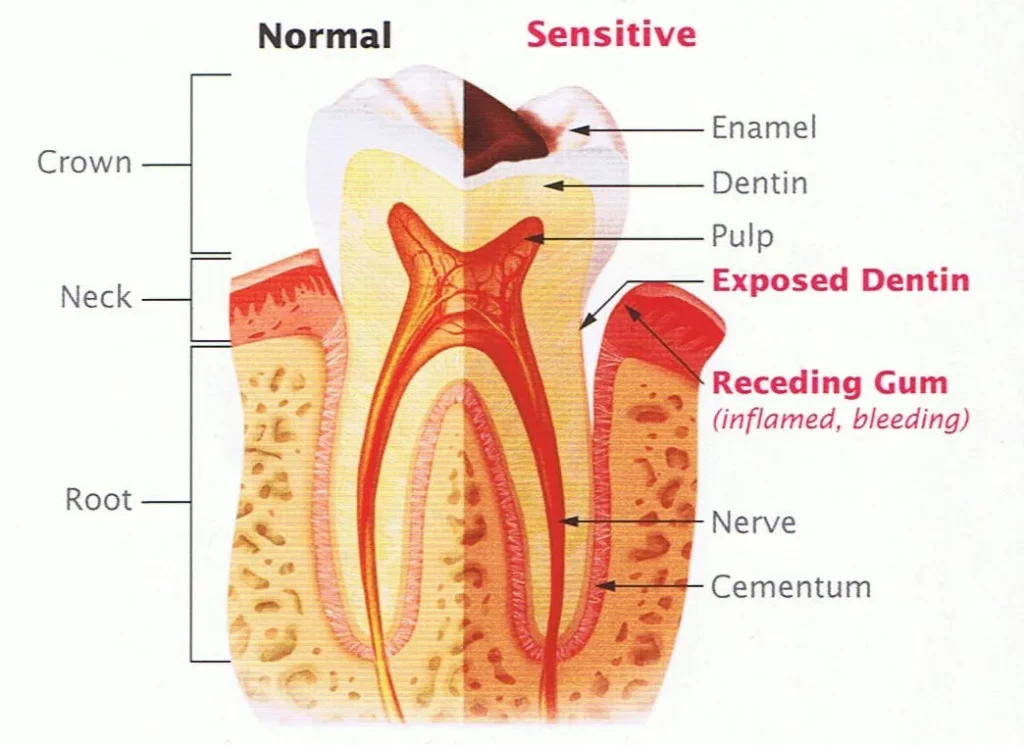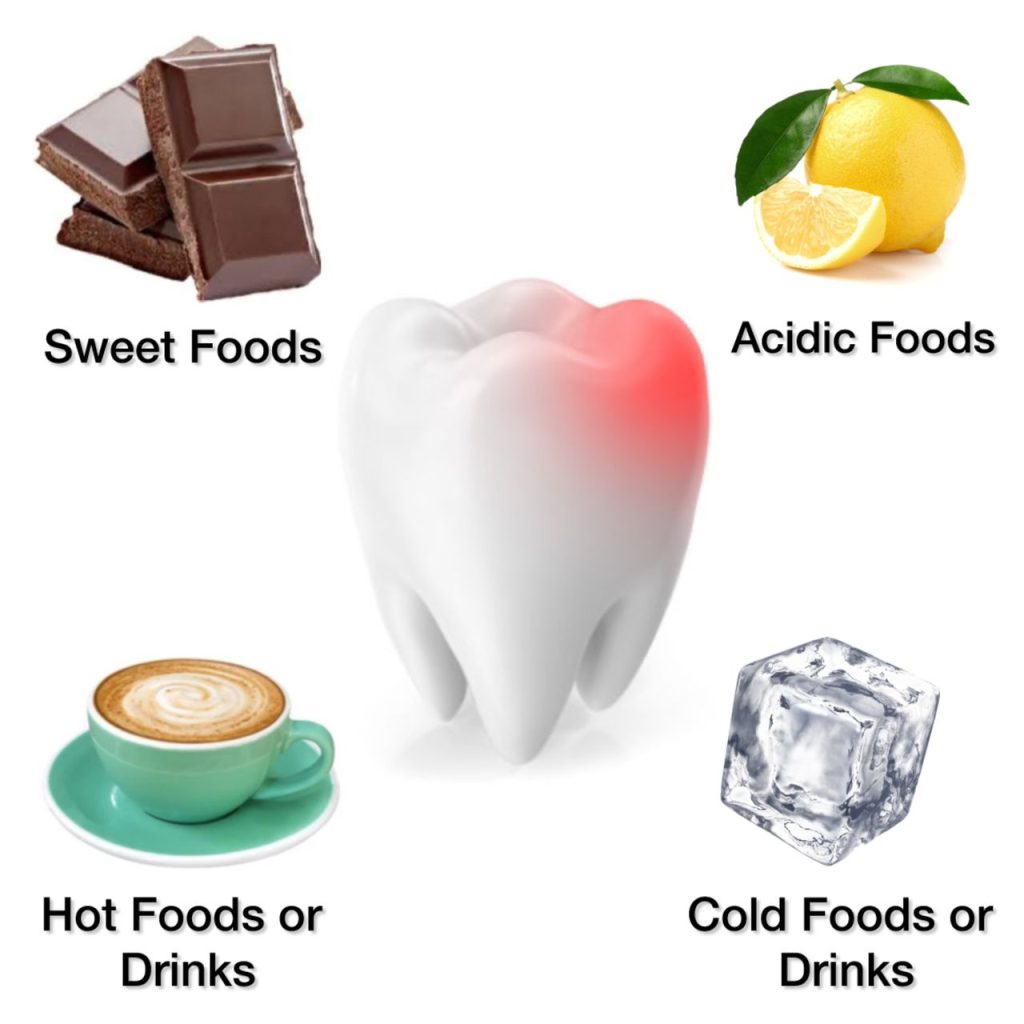Tooth sensitivity, or dentin hypersensitivity, is a common dental condition that causes discomfort or pain when teeth are exposed to hot, cold, sweet, or acidic substances. This condition can significantly affect daily life, making eating, drinking, and even basic oral hygiene routines uncomfortable. Fortunately, with the right care and treatment, tooth sensitivity can be managed and often alleviated. In this article, we will explore the causes, symptoms, and treatment options for tooth sensitivity, along with practical steps to improve your oral health.
What is Tooth Sensitivity?

Tooth sensitivity occurs when the protective outer layers of the teeth—enamel or cementum—wear down, exposing the dentin underneath. The dentin contains tiny tubules that lead directly to the nerve center of the tooth, making the teeth sensitive to external stimuli such as temperature changes, specific foods, or touch. This sensitivity may serve as a warning sign that something is wrong with the tooth, such as decay or damage, and it requires proper care to prevent further discomfort.
Causes of Tooth Sensitivity

There are several factors that contribute to tooth sensitivity:
- Enamel Erosion: Consumption of acidic foods and drinks can erode enamel over time, exposing the dentin beneath and leading to increased sensitivity. This is one of the most common causes of tooth sensitivity. Learn more about preventing tooth decay.
- Gum Recession: When gums recede, the tooth roots become exposed. These roots are not protected by enamel, making them more vulnerable to sensitivity. This issue can be caused by gum disease, age, or improper oral hygiene.
- Cracked or Fractured Teeth: Cracks or fractures in the teeth expose the dentin, leading to sharp pain when consuming hot, cold, or sweet foods. Proper treatment, such as dental bonding or crowns, can help protect these sensitive areas. Discover more about modern dental treatments.
- Aggressive Brushing: Brushing too hard with a hard-bristled toothbrush can wear down enamel and gum tissue, increasing sensitivity. It is essential to use gentle, circular motions while brushing to avoid damaging your enamel. Explore strategies for relieving tooth pain.
- Teeth Grinding (Bruxism): Grinding or clenching your teeth, especially at night, can wear away enamel and expose the sensitive dentin. Wearing a nightguard can help protect your teeth from grinding damage.
- Dental Procedures: Certain dental treatments, such as teeth whitening, fillings, or crowns, can temporarily increase sensitivity. While this is usually short-lived, managing this sensitivity can help make recovery more comfortable. Learn about the ultimate guide to teeth whitening.
- Acidic Foods and Drinks: Regular consumption of acidic foods and beverages, such as citrus fruits, soda, and wine, can contribute to enamel erosion, leading to increased sensitivity over time.
Symptoms of Tooth Sensitivity

Tooth sensitivity can manifest in various ways. Common symptoms include:
- Sharp Pain: A sudden, sharp pain when consuming hot, cold, sweet, or acidic foods and drinks. The exposed dentin allows stimuli to reach the tooth’s nerve, causing discomfort. Read more about orthodontic treatments.
- Pain During Brushing or Flossing: Sensitivity or discomfort when brushing or flossing, particularly in areas where the enamel has worn down or gum recession has occurred.
- Intermittent Toothache: A temporary toothache that may indicate underlying issues such as cavities or gum disease. Persistent pain should be addressed with professional dental care. Learn how oral bacteria can increase stroke risk.
- Localized Pain: Pain that is confined to one or a few teeth, usually due to exposed dentin or gum recession. This localized pain often worsens with certain stimuli.
Treatment Options for Tooth Sensitivity

There are a variety of treatment options available for managing tooth sensitivity. The best approach depends on the underlying cause of the sensitivity. Some common treatments include:
- Desensitizing Toothpaste: Specially formulated toothpaste designed for sensitive teeth can help block pain signals and reduce discomfort. These toothpastes contain compounds that protect the nerve endings in the exposed dentin. Explore veneers for sensitive teeth.
- Fluoride Treatments: Fluoride treatments, such as gels or mouth rinses, can help strengthen weakened enamel and reduce sensitivity. Fluoride works by remineralizing enamel and making it more resistant to external stimuli. Find out more about dental implants and post-care.
- Professional Dental Procedures: In more severe cases of tooth sensitivity, professional procedures like dental bonding, fluoride varnishes, or gum grafts may be recommended to protect exposed dentin and reduce sensitivity. Learn about modern dentistry services.
- Lifestyle Changes: Avoiding acidic foods and drinks, using a soft-bristled toothbrush, and wearing a nightguard if you grind your teeth can help prevent further enamel erosion and reduce sensitivity. Find out why regular checkups matter.
Additional Tips for Managing Sensitive Teeth
- Brushing Technique: Use gentle, circular motions when brushing to avoid wearing down enamel. A soft-bristled toothbrush is recommended to minimize enamel damage and gum recession.
- Dietary Modifications: Reducing the intake of acidic foods and drinks, such as citrus fruits, vinegar, and soda, can prevent further enamel erosion and reduce sensitivity.
- Nightguard for Teeth Grinding: If you grind your teeth, especially at night, wearing a custom-fit nightguard can help protect your teeth from wear and reduce sensitivity.
- Consider Dental Sealants: In some cases, your dentist may recommend the use of dental sealants to cover exposed dentin and provide additional protection.
Frequently Asked Questions (FAQs)
- Can tooth sensitivity go away on its own?
Tooth sensitivity may sometimes resolve on its own, especially if it is related to temporary factors like a recent dental procedure. However, if the sensitivity persists or worsens, it’s important to seek dental care to determine the underlying cause. Read more on cutting-edge techniques in dentistry. - Are there home remedies for tooth sensitivity?
Yes, using desensitizing toothpaste, avoiding acidic foods, and practicing good oral hygiene can help alleviate symptoms. However, professional care is often required for long-term relief. Discover comprehensive strategies for tooth pain. - Is tooth sensitivity a sign of a serious dental issue?
Tooth sensitivity can sometimes indicate a more serious dental problem, such as cavities or gum disease. If the sensitivity persists or is accompanied by other symptoms, it is important to consult your dentist for a thorough examination. Learn how to prevent tooth decay.
Conclusion
Tooth sensitivity is a common issue that can be effectively managed with the right care and treatment. Understanding the causes, symptoms, and treatment options is essential for finding the right solution. Whether it’s using desensitizing toothpaste, undergoing fluoride treatments, or seeking professional dental procedures, the right treatment can help alleviate discomfort and prevent further damage to your teeth.
If you are experiencing tooth sensitivity, consult your dentist for a thorough examination and personalized treatment plan. Regular dental check-ups and good oral hygiene practices are key to maintaining healthy teeth and minimizing sensitivity. For more information or to schedule an appointment, please visit our contact page.
